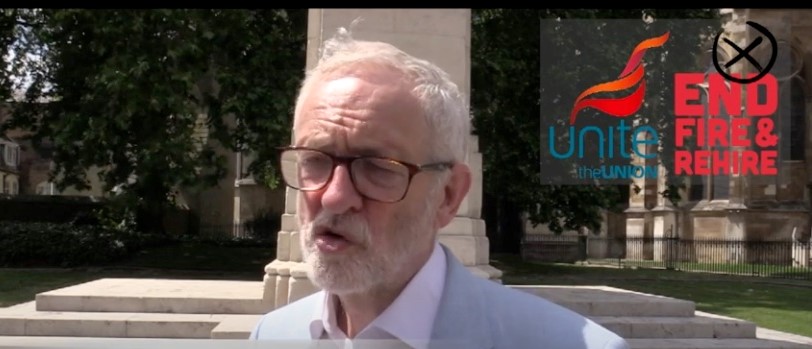Corbyn in ‘cash cow’ banks slam
Unscrupulous banking bigwigs are treating ordinary workers like a “cash cow”, Jeremy Corbyn told business bosses yesterday (Thursday March 3).
The Labour leader’s accusation was backed up by new Unite research which shows that this extends far within the banking industry itself, where 85 per cent of bank employees are consistently working unpaid overtime.
During a speech to the British Chambers of Commerce conference, Corbyn blasted “extractive” banking practises for driving the economy to the “point of collapse” in 2007, and said that fundamental reforms are needed to keep financial fat cats in check.
Reform
“The banking sector has to be reformed. Finance must support the economy, not be an end in itself, and certainly not an extractive industry that looks at consumers, entrepreneurs and small businesses as a cash cow,” Corbyn said.
“And we need to reform the major banks so that they serve the economy not just themselves. That includes using the public stakes in banks such as RBS to drive lending and investment in infrastructure, rebuilding supply chains and the industries of the future.”
Symptomatic of the need for the changes Corbyn is calling for, is the fact that in 2015 many big banks suffered huge losses – yet banking CEOs still walked away with millions of pounds worth of wages and bonuses. In contrast, banks use unfair performance metrics and obscure pay models to keep staff pay low.
Royal Bank of Scotland (RBS) boss Ross McEwan received almost ÂŁ4m in pay and bonuses in 2015, despite the bank still being part publicly owned, suffering an annual loss of ÂŁ2bn and widespread employee dissatisfaction.
RBS Unite members voted by 96 percent to support new payments for holiday pay and overtime and for ending sales-based performance pay in retail branches.
It was the same story with the CEO of Lloyds Banking Group (LBG), AntĂłnio Horta-OsĂłrio. He was paid ÂŁ8.5m last year, even though profits fell by 7 per cent and the government still retains a 10 per cent share in the bank.
More than 7,000 Lloyds workers who were excluded from a pay deal last year, received a rise thanks to union recognition.
At HSBC, CEO Stuart Gulliver has a pay and bonus package worth £7.3m, while HSBC staff were threatened with a pay freeze. Eighty per cent of managerial grades in retail and wealth management will not be receiving any pay rise in 2016. Only Unite’s recognition agreement protected clerical grade staff from the freeze.
Unite survey
A recent Unite survey of 5,000 employees across HSBC, TSB, LBG and RBS, shows just how deep discontent runs within the banking sector and how important it is to have union protection for all the industry’s workers.
Work related stress was reported by 72 per cent, all of whom are considering leaving their jobs, with 47 per cent citing pay as the reason and 58 per cent having to borrow money to meet daily expenses.
A massive 85 per cent reported having to regularly work unpaid overtime, with 20 per cent saying they felt pressured to do so and 67 per cent flagging up increased workloads.
Karen Evans* a Unite member said, “Unpaid overtime is a huge problem for us across all grades, departments and locations of the bank.
“I work in a call centre and more often than not we’re setting up for calls before our hours start and we’re still talking to customers when our shift is supposed to have finished. That time soon mounts up. We can be doing between two and three hours extra, unpaid overtime a week. And that’s on a good week!
“It’s a problem that affects all of us, so it’s important that we come together in the union to solve it,” she added.
In response to these concerns, Unite has campaigned to end unpaid overtime, scrap unfair performance management and extend the rights of members across Britain’s banks.
“Since 2008 the banks have axed thousands of jobs, leaving remaining staff facing ever rising workloads and an endemic culture of pressuring people into working unpaid overtime,” said Dominic Hook, Unite national officer for finance.
“This has led to a widespread rise in work-related stress, which results in serious long term health problems.
“Together our members have a strong voice for positive change within the banks. By coming together to tackle issues such as stress and unpaid overtime, we are changing the banks for the better.
“That not only benefits many thousands of bank workers, but the public who rely on their work.”
*Member’s name changed to protect identity
 Like
Like Follow
Follow


